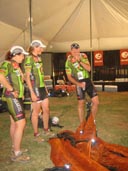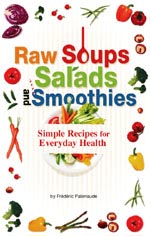|
Home :Sports Diet: Athlete Nutrition
ATHLETE NUTRITION: THE PRE-RACE MEAL
You are heading to the starting line and you take just one more swig of a sports drink or one more bite of a bar. Do you know when you eat greatly affects your performance? I fear I will never eat breakfast again, or at least before 11 AM. You will see why as we cover the pre-race meal. In every athlete’s career, food and nutrition is very important. Energy is required to nourish oneself and build stamina. Perhaps the most significant meal we eat, aside from the recovery meal, is the pre-race meal. Eating before long continuous exercises is very counter productive. It will hamper your performance. This has been proved time and again through research. This is because the body tends to slow down metabolism after a meal so that the food is digested properly. An athlete should be careful of what he eats before his race because the race for him can have disastrous performance effects. So, what do you eat? First let’s look at why we eat. WHY DO WE EAT THE PRE-RACE MEAL Athlete Nutrition
So how do you know if you have enough? If you had a good recovery meal after your last workout, you should have plenty of glycogen. If you didn’t recover properly it is too late. Eating right before a race will not help. In fact in can hurt you. I know you may be hungry, but this is OK, do not eat. Knowledge about your glycogen storage is important. Glycogen in the body gives you the supply of energy that you need while doing continuous exercise. To know how much glycogen you have and how fast you deplete it while exercising is an important factor in planning your pre-race meal. You can take note of this while training, by noting when your performance starts to drop and you need to refuel. This means you are running out of glycogen. Re-supply of glycogen is important to compete at a high level. THE PRE-RACE MEAL Athlete Nutrition
Perpeteum or Sustained Energy which contains carbohydrates and proteins and also a small amount of fat is also very much recommended for increase in performance. Solid food should be generally avoided, but if the body is craving solid food then you should go with food materials that contain high starch like bananas, potatoes, pasta etc. You need 3 hours to digest your food fully. Have a breakfast of around 200-400 calories. It should be easy to digest, high complex carbohydrates and little sugar, fiber or fat. You should consume 10-12 ounces of fluid each hour up to 30 minutes prior to the race. WHEN TO EAT THE PRE-RACE MEAL Athlete Nutrition
The key to the effectiveness of the pre-race meal is to give the body about three hours time before so that the nutrients can be extracted from the meal and the glucose reserves are filled. Three hours is more than sufficient time for your body to fully process the meal. You will be full of energy and your stomach also won’t be heavy to hinder you. Rapid elevated blood sugar can cause excess insulin release. This can lead to low blood sugar. I battled this for years. My family would make fun of me, as I would be “grumpy” if my blood sugar was low.
High insulin levels also use up the glycogen faster. You want to use your glycogen sparingly before you must start re-fueling. What if your hungry? It is OK to be hungry. It won’t hamper your race. Five minutes before the race you could have a gel or a sports nutrition drink. Or you could begin to fuel about 20 minutes into the race. Eating 100-200 calories, 5 minutes before the start, will not hinder performance, as you we will be well into the race before digestion begins. This is a good idea for tri-athletes who may be swimming for a while without fuel. Should you get up to eat? No! Sleep is more important than eating. As long as you start your fueling around 20 minutes into the race, you will be good. Topping off liver glycogen stores in the morning three hours early is a good idea if you can, but do not sacrifice sleep for eating. THE EXCEPTION TO THE RULE Athlete Nutrition
The reason is your body will be ready to expend the glycogen stores when you eat. This is what you want in a race that is short. The flood-gates of glycogen will open and you will actually perform better. Since you will not use all your glycogen in this short of period this is great and enhances performance. You should eat 1-2 hours before a race 90 minutes or shorter. HEED, or Hammer gel are excellent choices. You want to consume an easily digestible carbohydrate. This advice works if you have been re-fueling after your workouts. This is one of the number one ways to increase performance in the next workout. |
Sign up for our Extreme Adventure FREE Sports-ZineExtreme Adventure Sports Zine |
 Athlete Nutrition:You take great care with your diet but, what about your pre-race meal?
Athlete Nutrition:You take great care with your diet but, what about your pre-race meal?  The first reason we eat before a race is to top off the liver glycogen stores, your body used during sleep. Actually muscle glycogen remains very stable over night, therefore you do not need much.
The first reason we eat before a race is to top off the liver glycogen stores, your body used during sleep. Actually muscle glycogen remains very stable over night, therefore you do not need much. The pre-race meal should have both carbohydrates as well as proteins. You should not have a solely carbohydrate drink. A drink with both complex carbohydrates and soy protein will help in nourishing the body and producing high energy in the body.
The pre-race meal should have both carbohydrates as well as proteins. You should not have a solely carbohydrate drink. A drink with both complex carbohydrates and soy protein will help in nourishing the body and producing high energy in the body. When to eat your pre-race meal is as important as knowing what to eat for your pre-race meal. Sufficient time should be given to the body to digest and assimilate this pre-race meal so that we can make maximum use of the energy that was obtained by the meal.
When to eat your pre-race meal is as important as knowing what to eat for your pre-race meal. Sufficient time should be given to the body to digest and assimilate this pre-race meal so that we can make maximum use of the energy that was obtained by the meal. High insulin levels (low blood sugar) inhibit lipid mobilizing during aerobic exercise. This means you will not burn fat efficiently. You want to burn fat efficiently for more energy.
High insulin levels (low blood sugar) inhibit lipid mobilizing during aerobic exercise. This means you will not burn fat efficiently. You want to burn fat efficiently for more energy. There is an exception to this rule. If you are racing 90 minutes or shorter you do not need to allow three hours prior to the start.
There is an exception to this rule. If you are racing 90 minutes or shorter you do not need to allow three hours prior to the start.





